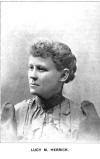
Major Israel Herrick

Frank Herrick

Lucy M. Herrick |
Pg. 199 -
HERRICK (ENGLISH FAMILY)
Eirikr,
Eric, Erik, Erick, Irik, Eyryk, Erryk, Herik, Hireck,
Heryck, Hericke, Hearick, Heyricke, Heyrick,
Herrick.
This very ancient and much cherished Scandinavian
cognomen has passed through numerous variations and
mutations in England, some of which may have been
idiomatic, but generally they are referable to the
prevailing fancy of the early ages of English
literature, and the absence of anything like an
established orthography. Recurring to the
English orthography of our own name, in all its
variety and mutability for many centuries, we
perceive something like a progressive transition
from the original Scandinavian Eirikr, down
to the settled and permanent English Heyrick
and Herrick of the seventeenth century.
The earliest English forms were Ericke,
Eric and Erik with occasional variations
in the final letter, and some few instances of the
substitution of I instead of E as the initial.
In the twelfth century, Henry of Great
Strettan spelled his name Eyryk.
A. D. 1450 Robert of Houghton wrote Eyrick,
and about the year 1500 his son Thomas,
spelled his name Eyricke and Eyrick,
and his son, John of Leicester, merely
indulged in a great variety, as: Eyrik, Eyrek,
Eyricke, to which last, the engraver of his
epitaph, for the first time on record, prefixed the
H. unless, indeed, it may have been previously
assumed by his son Nicholas of London, who
had early chosen the name Heryk, which his
sons again changed to Herrick about the
middle of the seventeenth century; at this time, or
a few years earlier, the sons of John of
Leicester had fixed the orthography of the names
Herrick and Heyrick which have remained
permanent and unchanged
Pg. 200 -
to this day; Robert the eldest son, having
assumed the latter, and the other sons of John,
the former.
The traditions of this very ancient family, claim
descent from Ericke,a Danish chief, who
invaded Britain during the reign of Alfred,
and having been vanquished by that Prince, was
compelled, with his followers, to repeople the
wasted districts of Easat Anglia, the government of
which heheld as a fief of the English crown.
He is recognized in history as Ericke, King
of those Danes, who hold the Countrie of East Angle.
In an attempt to unite the Danish power in Britain
against the Englishmen, Ericke was defeated
by Edward, the son and successor of
Alfred; and was subsequently slain by his own
subjects for alleged severities in his government.
The Norman invasion found this name represented Eric
the Forester, who resided in Leicestershire, and
possessed extensive domains along the sources of the
Severn and on the borders of Wales. Eric
raised an army to repel the invaders and in the
subsequent efforts of the English Earls and Princes,
to dispossess the Normans of their recent conquest,
and to drive them out of the country, he bore a
prominent and conspicuous part. But he shared
also, in the unfortunate issue of all these
patriotic efforts. His followers and allies
were stripped of their estates, and the sources of
his own power were dried up; and being no longer in
a condition formidable to new government, Eric
was taken into favor by William - entrusted
with important offices about his person, and in the
command of his armies; and in his old age was
permitted to retire to his house in Leicestershire,
where he closed a stormy and eventful life, as
became the representative of an ancient and
distinguished race.
With this hasty glance at our earliest family
remembrances, remote and obscure as they may be, we
proceed to deduce the pedigrees of the English and
American races through the branch of the posterity
of Eric the Forester, which is still
respectably known in England, and whence we derive
our lineage.
Henry
Eyryk, a lineal descendant from Eric
the Forester, was seated at Great Strettan in the
County of Leicester, England, at a very remote
period. His grandson, Robert Eyryk
of Strettan, by his wife Joanna had Sir
William , Robert and John.
Sir William Eyryk, Knight of
Strettan, was commissioned to attend the Prince of
Wales on his expedition into Gascony in the year
1355.
From Sir William, descended Robert
Eyrick of Houghton on the Hill, living 1450,
who left by his wife Agnes, Robert
(who died without issue) , and Thomas
Eyrick of Houghton, who settled in Leicester.
He died in 1517 leaving Nicholas, John
and Elizabeth. John Eyrick
or Heyrick of Leicester, born 1513; died
April 2, 1589; twice mayor of that corporation, 1559
and
Pg. 201 - |
![]()